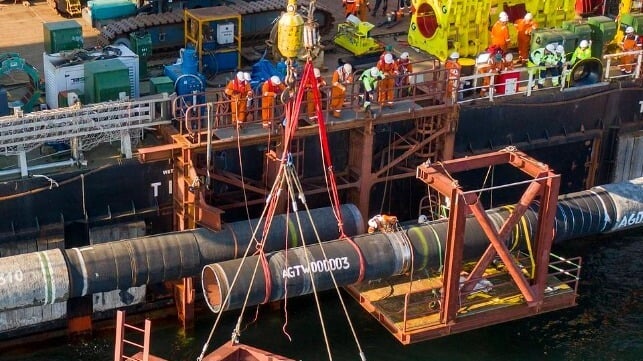With Nord Stream Shut, Gazprom Posts its Biggest Lost in Two Decades

State natural gas company Gazprom was once a major source of income for the Russian government, earning tens of billions of dollars in profit every year. Gas accounted for about a fifth of Moscow's earnings from petroleum exports, according to The Economist. But those days have passed: on Thursday, Gazprom announced its first annual loss in more than two decades.
Gazprom made more than $22 billion in net profit in 2021, the last year before the war. That dropped to $13 billion in 2022, the year that Russia invaded Ukraine and then throttled down its pipeline gas exports to Western European customers. Despite the disruption, Russian energy analysts had expected the gas giant to post a profit in 2023 - a smaller profit, but still about $5 billion. Instead, Gazprom swung to a net loss of nearly $7 billion, driven down by plummeting sales of pipeline gas to Europe.
After Gazprom self-imposed a pipeline gas embargo on its European customers in the early months of the war, its onshore pipeline sales dropped sharply, and have not recovered. (Gazprom's subsea Nord Stream export pipelines to Germany were also shut down shortly after the invasion began, and later destroyed in a suspected sabotage attack.) Reuters estimates that Russian gas exports to Europe are down by 55 percent this year, though some countries continue to buy.
"The remaining flows are more difficult to phase down due to the combination of geography, contractual commitments, and - in some cases - political expediency," Akos Losz of Columbia University's Center on Global Energy Policy told RFE.

that matters most
Get the latest maritime news delivered to your inbox daily.
Gazprom may have a hard time recovering from the loss of its relationship with European buyers. It lacks capacity to export its gas as LNG, and its first liquefaction terminal project in the Baltic region - Baltic LNG - has been sanctioned by the United States. In the long term, the company would like to develop its market share in Turkey and in China, but it is unclear if this strategy will offset the loss of its decades-long sales relationships with European customers.
"Gazprom is unlikely to rebuild its position on the European market in the coming years due to infrastructural and political obstacles. These include the damage to both lines of Nord Stream 1 and one line of Nord Stream 2, as well as the unclear status of future shipments through Ukraine," wrote Poland's Centre for Eastern Studies (OSW) in a recent analysis. "Officials from Gazprom and the Russian government seem to be aware of these challenges, as evidenced by their push to redirect supplies to the east."
